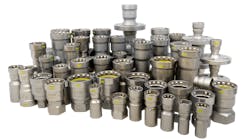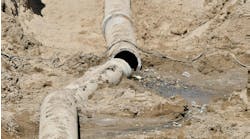CONCORD, N.H. — This fall New Hampshire House of Representatives passed into law a bill prohibiting local governments from requiring installation of sprinklers in any new or existing detached one- or two-family dwelling unit. The bill preserves existing ordinances, but also eliminates enforcement of any existing ordinance, regulation, code or practice that requires the installation or use of sprinklers in manufactured homes located in manufactured housing parks.
Following a similar Senate action in September, the House overrode Governor John Lynch’s veto of the bill. In Lynch’s veto message, published in July, regarding S.B. 91, he wrote, “This bill will limit the choices available to communities in meeting local fire control requirements. Instead of providing a range of options, communities will now have to revert to requiring what may be more costly options: fire ponds, cisterns, wider road widths, increasing the size of building lots and increasing the size of distance between buildings.
“The decision of whether or not to require automatic sprinkler systems for new or renovated residential development has been, and should remain, a local one. The State should not preempt local decision-making. That is why I vetoed H.B. 109, a related bill that prohibits local planning boards from adopting regulations requiring sprinklers for one and two family homes in new subdivisions. S.B. 91, like H.B. 109, will remove local control over an important issue.”
Related Articles:
Residential sprinklers remain under attack
Related Articles:
Pa. H.B. 377 is signed, repeals fire sprinkler mandate
In response to the House overriding the Governor’s veto of the sprinkler bill, President of the National Fire Sprinkler Association John A. Viniello said, “They have taken government ability away to require sprinklers in homes. What happens to a municipality or community that is way out in the suburbs, away from a large city and they don’t have a paid fire department (almost 80% of fire departments are volunteer). How do you get to a house that is on fire in a timely manner? Why wouldn’t you leave it to the local legislature? The municipality understands its own situation more than the people in Concord, N.H. At the very least local communicates should have the ability to decide for themselves.”
Senator Fenton Groen said that homeowners will benefit from this bill because they will be able to decide for themselves if they want sprinklers in a new home.
“It’s up to the individual,” said Groen. “They can look at it and say this is what they want, and I’m perfectly fine with that.”
Representative Jennifer Coffey said that placing such a mandate, especially for first time homeowners, would make it harder for many to afford the purchase of a home.
“Estimates range from $5,000-$10,000 or more in additional costs to construct homes with sprinkler systems,” said Coffey. “This creates a disincentive to build new homes, to buy new homes and to expand or retrofit older housing stock. Ultimately, it makes housing less affordable and places a greater burden on our homebuilding sector to recover from our economic downturn.”
Regarding the elimination of enforcement of existing ordinances for manufactured homes, Coffey said that during the discussions after the bill was introduced it was found that when a home was moved from one mobile home park to another, it may be subject to a sprinkler requirement.
“When the new facility was located in a town that had a sprinkler ordinance, the home would suddenly be subject to a requirement for sprinklers that would often be cost prohibitive for the owner,” said Coffey. “This limited the ability of people to change communities and hurt businesses, which is why the legislature felt the matter was important to address.”
According to Groen, the law eliminates the existing ordinances for manufactured homes in mobile parks because the legislature wanted to honor past agreements for subdivisions that were approved with sprinkler requirements, but felt it necessary to do away with the existing ordinances covering mobile home parks due to cost.
“The exception is mobile home parks where the cost is very prohibitive in comparison to the value of the home (it adds up to 25% to the cost),” said Groen.
Groen added that there were other reasons besides cost that came into play, such as pipes freezing, which is not uncommon, in the crawl spaces under the homes.
Manufactured homes, including mobile and modular, are known to the fire service to be even more at risk of life and property loss than site built homes, according to Jeffrey Shapiro, executive director of IRC Fire Sprinkler Coalition, and nevertheless, because construction of such homes is covered by Federal law that is enforced at the state level, they are sometimes excluded from being required to comply with state or local regulation.
“Despite what some believe, local regulations for fire sprinklers can co-exist with current laws governing manufactured housing, and some jurisdictions requiring sprinklers in all new homes have successfully mandated that sprinklers be installed,” said Shapiro. “The only hiccup that I've heard of relates to licensing laws for sprinkler installers if the home is manufactured in one state and installed in another. In such cases the installer at the factory may need to be licensed in more than one state if there are licensing requirements at all (many states have no such requirement for residential sprinkler installers).
“It took roughly 20 years for the public to fully embrace smoke alarms as a minimum safety feature in new homes, and builders strongly opposed smoke alarms when they were originally proposed to be mandatory,” said Shapiro. “As the public became aware of the safety provided and jurisdictions where smoke alarms were mandatory began to accumulate data showing their value, the landscape changed. It is my hope, and ultimately an expectation, that we'll see the same type of change with respect to residential sprinklers. Consider that all multifamily occupancies are now required by the model codes to have sprinklers and that most people will live in an apartment or condo before owning a home. It makes sense that, at some point, home buyers will routinely ask, why doesn't my new home have the same level of protection that I had in my apartment/condo.”

